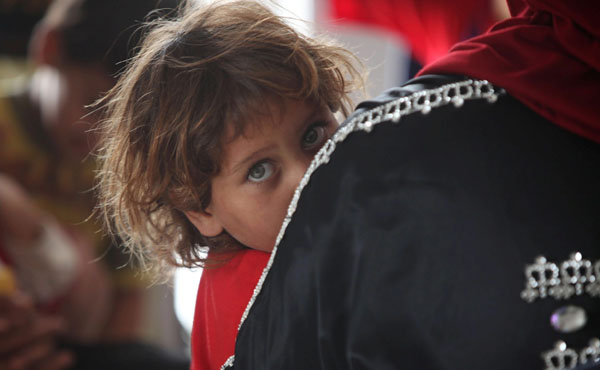Interning in a crisis: when Mackenzie Lee, a rising senior at St. Mary’s International School in Tokyo offered to share some experiences of a recent placement with The Japan Association for UNHCR, we were more than a little intrigued.
Take a long, hard look. We all have at the very least a vague, generic sense of the Syrian crisis – the internal conflict, the boundless carnage, and the displaced civilians. Media outlets around the globe have used phrases like ‘enemy-combatants’ or ‘fog of war’ or ‘collateral damage’, clouding our understanding of this unmitigated humanitarian disaster.
Understandably, or inevitably, many of us don’t know what to do about or how to help those affected by the Syrian crisis. And that’s fine. Sadly, personal involvement in a war half-way around the globe just doesn’t appeal too many of us, and incomplete information about the matter has only exacerbated our overarching apathy in regards to this situation.
“Over in Minami-Aoyama, an assembly of about 40 people has exhausted countless hours over the past 15 years attempting to buck this unfortunate trend of apathy.”
Heck, I’ll be the first to admit that I initially had little, almost no concern about the situation in Syria.
Over in Minami-Aoyama, however, an assembly of about 40 people has exhausted countless hours over the past 15 years attempting to buck this unfortunate trend of apathy.
The Japan Association for UNHCR, which works in close correspondence with the UN Refugee Agency (UNHCR), has sought to raise public awareness of crises around the globe and to stimulate general interest in the resulting exoduses of refugees. In the past, they have helped refugees in the Balkans, Afghanistan, Darfur, Haiti, the Tohoku region and, most recently, Syria.
The UN Refugee Agency as a whole is mandated to protect, assist, and educate refugees around the globe as well as improve upon such refugees’ situations from a humanitarian standpoint, and though the agency is a member of the United Nations Development Group as the famous UNICEF, UNESCO, WHO, and WFP are, it is not as well-known as the aforementioned groups and often requires subsidiary support to make ends meet.
This NPO attempts to instigate genuine public support for the hardships that refugees around the globe face and ultimately helps the UN Refugee Agency meet fundraising objectives.
I have recently been blessed with the opportunity to work with Japan Association for UNHCR. While as a high school intern I have by no means assumed a major role in the organization, I have developed first-hand knowledge of the ins and outs of the group and have witnessed the genuine passion that stems from each and every employee. And though in its present state Japan Association for UNHCR may be a small organization that many Japanese, let alone foreigners don’t know of, I know that the spirit that this group attempts to foster takes precedence over its quantitative fundraising achievements.
My involvement in Japan Association for UNHCR has transformed my outlook on refugees around the world. I’ve come to realize through observation and experience that what we often assume to be a substantial level of understanding regarding such crises exists by and large only on a superficial level. The issues surrounding such crises and the refugees involved are more important than the simple relocation of a mass group of people; the bigger picture provokes us to introspectively search the morals and humanitarian concerns behind such global problems.
As of now, the Syrian crisis has raged on into its third year with no apparent signs of slowing down – the recent G8 summit in the UK notwithstanding. What started as innocuous riots against the regime of Bashar al-Assad during the Arab Spring has developed into a bona fide war between Shiite Muslim-backed Assad and his Sunni Muslim pro-democratic opposition. And while the war has steadily simmered and gained steam, the exodus of Syrian refugees has correspondingly accelerated, with over a million refugees arriving in neighboring nations in just the past six months.
As a whole, 1.5 million Syrians have sought refuge in neighboring nations such as Turkey, Lebanon, Iraqi Kurdistan, Jordan, and Iraq – current predictions show that by the end of 2013, over 3 million refugees will have escaped from the tumult in Syria. More than half of such refugees are children, and more than 75% of the refugees are under the age of 18 or are women.
Years without education, psychological trauma from witnessing various deaths and sexual abuse has and will continue to hamper these young minds. The Syrian crisis is only superficially a clash between Bashar al-Assad and his opposition or a debate about whether the United States should intervene in another war; indeed, the far-reaching effects of the battle are truly shown in the humanitarian crimes committed to third-party individuals.
The Japan Association for UNHCR has spent hours attempting to spread this message to the public and cultivate a spirit of empathy and compassion in an age largely devoid of it. To find out more and to see what you can do to help from here in Japan, visit the Japan Association for UNHCR website at: www.japanforunhcr.org
Mackenzie Lee was born and raised here in Japan and is now a rising senior at St. Mary’s International School, in Tokyo.
Image: Courtesy The Japan Association for UNHCR









